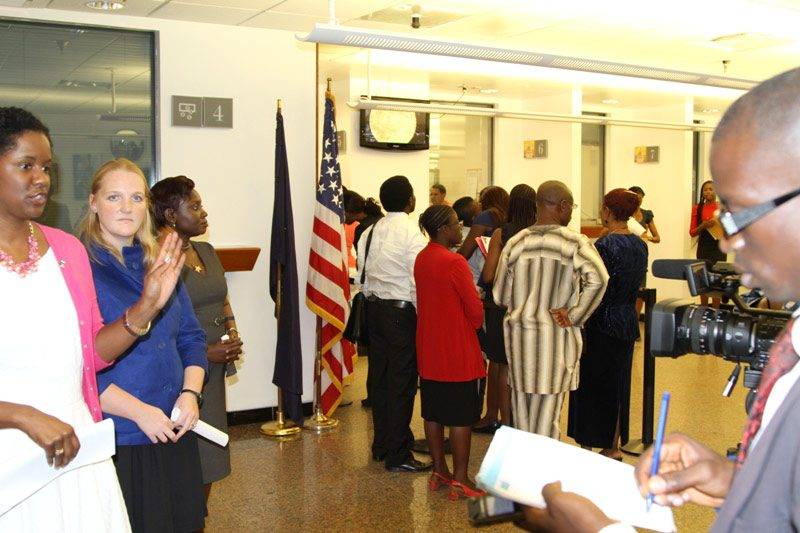The U.S. Has Jacked Up Visa Costs For Nigerians All Over The World & The Official Reason May Not Be The Real Reason

The past two weeks have been particularly rough for Nigerians in the diaspora. From the Invictus Obi fraud allegation and subsequent arrest to the FBI releasing a list of 80 Nigerians who have been implicated in a massive organised fraud ring, now is not the best of times to be a Nigerian living abroad.
Throw that in with the 23 Nigerians who are on death row in Saudi Arabia for drug offences and another fraud bust that happened in far-away Australia not too long ago and the situation becomes a lot more worrying. One gets the feeling that part of the fallout from the series of incidents might involve countries shutting their doors to Nigerians, or at the very least, doing the most to ensure they don’t get in so easy. And it looks like some countries are already adopting such measures.
Just yesterday, the United States Embassy in Nigeria made it known that effective from Thursday, August 29, 2019, Nigerians applying for tourism, student and business visas will not only pay the customary non-refundable NGN 59.2 K visa application fee but will also have to pay an extra USD 110.00 (NGN 40.7 K) after the visa has been issued to them, bringing the total cost to NGN 99.9 K at the very least.
The U.S. Embassy in Nigeria revealed that the Trump administration has imposed a “reciprocity” fee for all approved non-immigrant visa applications by Nigerians. The fee will be charged in addition to visa application fees (usually paid at the start of the application process) for only applicants who are issued visas.
REVISED VISA RECIPROCITY SCHEDULE FOR NIGERIA: Effective worldwide on 29 August, #Nigerian citizens will be required to pay a #visa issuance fee, or reciprocity fee, for all approved applications for #nonimmigrant visas. Read more – https://t.co/Nl9GTbdG9b
— U.S. Mission Nigeria (@USEmbassyAbuja) August 27, 2019
The additional reciprocity fees range from USD 80.00 to USD 303.00 depending on the class of visa. According to the U.S. Embassy, the majority of Nigerian applicants currently pay between USD 160.00 to USD 265.00 for U.S. visitor visas.
And such applicants will now have to pay an extra amount if their visa application is successful, bringing the total figure to between USD 240.00 to USD 570.00 for every successful visa application. Given that the U.S. Embassy charges Nigerians at the rate of NGN 370.00 per dollar (higher than both official and black-market rates), it’s basically a rip-off.
The U.S. Embassy in Nigeria says the reciprocity fees are in response to the impasse reached in talks with the Nigerian government over the adjustment of the fees it charges American applicants who are looking to obtain Nigerian visas.
According to the Embassy, the total cost for a U.S. citizen to obtain a visa to Nigeria is currently higher than the total cost for a Nigerian to obtain a comparable visa to the United States. And the latest adjustment to the fees is meant to eliminate that cost difference as required by U.S. laws.
The rationale behind the increase does come across as plausible but the fact that the timing just had to coincide with this period of clampdowns on Nigerians involved in crimes in the U.S. is what raises concern. In truth, back in 2017, the Trump administration had pushed for stricter visa restrictions in some Islamic states and countries where it seemed the U.S didn’t have favourable visa reciprocity agreements with respect to validity periods and application fees. And it appears Nigeria fits into the latter.
The U.S. Embassy claims to be acting on that visa policy move from 2017 but it does raise eyebrows as to why they had to wait so long to finally implement it, and why it had to happen during this time when many Nigerians living in America are turning up on the FBI radar for fraud.
In another development coming in the wake of more than 70 Nigerians being indicted by the Federal Bureau of Investigation, the Nigerian Embassy in the United States issued a statement in which it said the President Muhammadu Buhari administration “condemns such criminal acts in all ramifications”.
The statement signed by Senior Counsellor/Head of Chancery, Mohammed Suleiman, on behalf of Ambassador Sylvanus Nsofor, expressed the federal government’s “willingness to cooperate with the government of the U.S. in accordance with the laid-down universal human rights and due legal processes.”
Through the statement, the embassy also reaffirmed that Nigerians are generally law-abiding and hardworking people wherever they are, including in the U.S. But perhaps it was too little too late.
The non-refundable reciprocity fee will now be paid by all categories of Nigerians in any part of the world and this is coming after the U.S. also indefinitely suspended its interview waiver process for visa renewals for Nigerian applicants in May.
Whether this measure is aimed at cutting down on the number of Nigerians visiting the United States given the recent surge in fraudulent crimes perpetrated by Nigerians in the diaspora, or retaliation from the U.S government in response to unfavourable visa stipulations for U.S. citizens looking to obtain Nigerian visas, one thing that is certain is that obtaining a U.S. visa is about to become a lot harder for Nigerian applicants.
Featured Image Courtesy: alternativeafrica.com